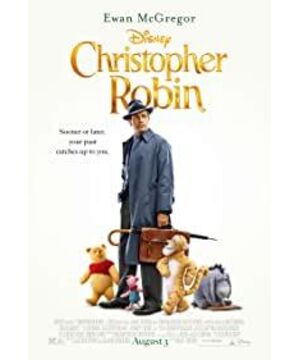Since the trailer was released in April this year, Disney's "Christopher Robin" (or translated as "Winnie the Pooh Live Action") has received widespread attention. But what is interesting is that the box office results were not satisfactory after the North American release on August 3, and the total box office in the world was only more than 20 million US dollars in the first week of the release.
On the other hand, the reputation of the movie is not ideal. The current rotten tomato index is 72% and the popcorn index is 86%.
"Routine", "Formula", "Slow and dull", and "Lack of depth" are the labels given to this film by most film critics in North America.
"Christopher Robin" tells the story of a young Christopher who had to leave the forest of a hundred acres because he was going to boarding school and bid farewell to these little toys.
After experiencing father bereavement, falling in love, getting married and having children, war, and work, Christopher, who has entered middle age, has to face high-intensity work pressure on the one hand and neglect to accompany his wife and daughter; on the other hand, in order to allow his daughter to be able to Successfully enrolled in the "top" boarding school Gefu Preparatory Middle School and took pains to set strict demands on her daughter.
On a weekend when his family was planning to go to the country for a holiday, Christopher was asked to work overtime due to work. His wife had no choice but to take the two daughters to the country. But the Pooh Bear in the forest of Hundred Acres came to London and met Christopher under the accidental collision, and the story unfolded.
"Nostalgia" is my most intuitive feeling about this film. From the beginning of the film, the hand-painted hand-painted Winnie the Pooh manuscript was slowly spread out, and the strong nostalgia began to control the tone of the film.
After entering the normal narrative of live-action CG animation, the film's picture continues to strengthen this nostalgic feeling in the dark and gloomy tone, the soothing and graceful and slightly sad soundtrack, and the restrained expressions and tone of the characters.
What's interesting is that the little toys are smart, cute, or cute, and their language and actions form a strong contrast with this narrative tone, which not only brings the expected fun, but also in the atmosphere because of this contrast. The effect of nostalgia is enhanced very brilliantly.
Many people think that the pace of this film is too slow, I think this is actually more in line with the narrative characteristics of memories. From a normal perspective, the joys, joys, excitement, pain, and emotions of childhood can be left behind after decades of time, and may be just as shown in the film, slightly sad and calm.
For the expression of this emotion, I think this film is quite successful. For example, after leaving the forest of Hundred Acres, the film used a six-minute clip to introduce Christopher’s young life:
Just like many similar clips, this kind of montage narrative based on the memories of life and past events has never been difficult to evoke people's memories and sad emotions. This is especially true in the film’s excellent soundtrack and images with great British classical aesthetic appeal.
Of course, relative to the narrative characteristics of the Hollywood model, the whole film may be slightly slower. But the point of "Christopher Robin" may not lie in the story itself.
Compared to the dismal North American market, the film was released in Japan on September 16, and the response has been extremely enthusiastic. In just three weeks, the total number of viewers reached 1.45 million, and the cumulative box office exceeded 1.9 billion yen.
In my opinion, this film does not correspond to the Western aesthetic values accustomed to contradictions and conflicts, but the style and tone are consistent with the implicit and introverted characteristics of Eastern aesthetics. This may be the reason for the difference between the Japanese market and the North American market. one.
On the other hand, this film makes an interpretation of the middle-aged crisis of the middle class that is more in line with the characteristics of the reality of Eastern society, and the logic of the story based on the contradiction between family and work may also be easier to obtain the psychological identification of Eastern audiences.
For example, in the company where Christopher works, the boss desperately asks for cost reduction or layoffs, forcing Christopher to sacrifice overtime on weekends. When Christopher, who had originally promised to go to the country with his wife and daughter on holiday, tried to refuse, he was choked back by his boss:
In modern European and American countries, similar scenes and typical dialogues between Christopher and his boss may not be common in many films, but in Eastern society, it should not be uncommon in Japan or South Korea. This can probably be understood as one of the reasons why North American film critics did not buy the film.
In addition, Christopher also took great pains in order for his daughter Madeline to successfully enter the Griffin Preparatory Middle School. When his daughter discovered the toy he had hidden when he was a child and played with it happily, Christopher said to Madelyn: "Can't you do something meaningful? Like reading a book."
In the social reality of fierce competition, for middle-aged Christopher, who has "has not laughed for years" under pressure, the fun and happiness of childhood are already "meaningless things".
In order to please her father, Madeleine worked hard to finish reading the books on the book list of Griff Preparatory Middle School, hoping to get a "nothing to do" weekend with her parents.
Faced with his disappointed daughter, Christopher, who was unable to go on holiday because of overtime work, retelled what the boss said to him almost exactly as it was to Madelyn:
"But dreams have to pay", "you must work hard for dreams", "there is no free lunch". Christopher, who is convinced of this, even holds a thick book of history when telling his daughters bedtime stories. The book read "Victorian era was the peak of the industrial revolution".
In his opinion, "this allows her to face the real world early and prepare for the future."
Thinking of the "list-based parenting" that has caused widespread discussion during this period of time, perhaps such a story segment can only resonate more deeply in Eastern society.
However, work and her daughter’s future pressure and anxiety cannot be understood by his wife Evelyn. In Evelyn’s view, it doesn’t matter whether the future is better or worse, "We don't care, we want you."
The contradiction between work and life is obviously universal. "We are working hard to live better in the future" and "Our life is now." These two concepts cannot simply distinguish who is right and who is wrong.
The most successful aspect of "Christopher Robin" lies in the discovery and capture of this kind of realistic contradiction that is more typical in modern Eastern society with the help of strong and sad nostalgia.
But in the face of such contradictions, the film is actually unable to conduct a deeper discussion and analysis. At the end of the film, for a happy ending, the contradiction between reality and ideal had to be reduced to the contradiction between Christopher and the president's son.
And the theme that runs through the whole film: Doing nothing leads to the very best something (doing nothing leads to the very best something), it seems that it can only be successful in the movie, once it is put in front of reality, it will be as pale as ridiculous.
To add an episode, in the real world, childhood Christopher was disappointed and sad because his parents wrote himself as the protagonist of a best-selling book and spent a lot of time promoting the "Winnie the Pooh" story.
In order to promote this story, Christopher's parents worked hard to create a "perfect" parent-child relationship in front of the media, but Christopher was very disgusted with it. He was also hurt because his mother was emotionally alienated from him.
In 1948, Christopher moved with his wife to Dartmouth after getting married and opened a bookstore. He occasionally visited when his father was seriously ill. After his father's death, he refused to profit from his father's royalties.
The relationship between Christopher and his mother has never been reconciled, and even his mother refused to see Christopher before he died.
I hope that such a tragedy will never happen again.
View more about Christopher Robin reviews











